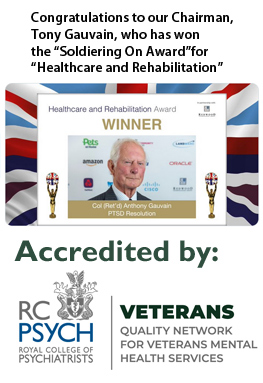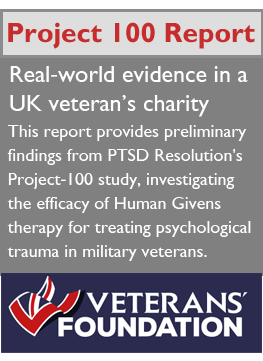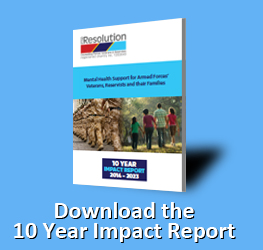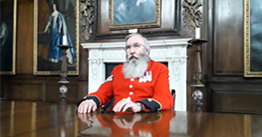The theme of the conference was ‘The military mind – the same but different’. The purpose was to explore and improve our approach to working with Armed Forces Veterans, Reservists and Family members, by adapting our general therapeutic skills to the context of the military experience. Over 70 people attended.
Tony Gauvain, Chairman and CEO, gave an overview of the Charity’s progress; the current referral total of 1605; the referral rate of 8 per week; the 65 prisoners treated across 22 prisons; and the hundreds of testimonials received, extracts of which were shown on a slide show. The status of the latest application for membership of COBSEO was explained. Reference was made to the King’s College service evaluation of 504 cases, available from the website. The next service evaluation was announced, which is planned to examine the reasons for PTSD Resolution’s effectiveness.
Bill Andrews presented the up to date analysis of results as collated from Pragmatic Tracker on 350 cases and exactly 100 therapists across the UK. The overriding conclusion is that the level of effectiveness is being maintained. Details can be found in his slides which are are available HERE
Mary Austin, HG therapist, presented case studies and her experiences with female clients, A Veteran’s partner gave a moving account of her life with a PTSD sufferer, and the benefits and results of help. Veteran Michael announced his intention to start a Veterans’ fishing club for therapeutic purposes and a fundraising fishing competition in August.
Andrew Hawkins, HG therapist, presented a case study and his experiences with male clients. Russell gave a moving account of his experiences before and after help, and his appreciation of the results. His partner, Jenna, very bravely also gave an account of the impact on her life and how the results have enabled them both to resume a normal family life including an addition to their family.
The Round Table discussions on “What makes military minds different?” resulted in the following observations:
- Some can come from chaotic background with lack of attachment making service life seem attractive.
- Some may have had trauma prior to entry
- Needs are met whilst in service but little to fall back on afterwards
- Training conditions behaviour – but there is no re-conditioning after release
- Loss of belonging and personal identity after release
- Used to orders, structure, discipline
- Different rules – learnt culture
- Develop extra strong sense of status – pride in regiment / sense of ‘alpha’ status
- Different/dark humour
- Moral injury - idea of who / what they are is damaged
- Trauma embedded by guilt – survived / failed in duty
- Shame – reticence to admit to weakness
- Can kill, have killed and are killed
- Isolation / abandonment / lack of belonging after release
- Sense of betrayal / sold a lie / duped / no support after leaving
- Can be separated from family for long periods – making relationships difficult with different coping strategies, putting partners at risk
- Lack of understanding by civilians of circumstances / pressures / experiences
- When trauma has been de-activated usually a wealth of resources to draw on is re-discovered
Matthew Green, journalist and author, presented on his reflections of military trauma, as described in his book Aftershock ( http://portobellobooks.com/aftershock.); and the impact of military trauma on families.
Charles Highett, Finance Director, explained the continuing pressure to raise funds, and asked all to give serious consideration to how each one of us might do something to help.
Abigail Darling, HG therapist, presented on her experiences with clients at risk.
Renee Van der Vloodt, HG therapist, introduced Louise Chester and Dr Julia Ronder who presented on Mindful Self Compassion and its potential application for therapists and clients as a complement to the Human Givens approach. (http://mindfulnessatwork.com/courses/open-courses/)
Alan Barry, Veteran, businessman, and author gave an amusing yet telling account of his life leading to the writing of his book ‘Salesman and an AK47’.
(http://www.alanbarryauthor.com )
Piers Bishop, Co- founder and Clinical Director, Brought to day to a close by reminding everyone how well they are doing, and what potentially interesting and challenging times lie ahead.
FEEDBACK COMMENTS
• Thoroughly enjoyed the day – extremely useful hearing personal perspectives.
• Really good to hear more about families.
• Great conference, really useful. Loved hearing from people treated and families- very powerful and we don't often hear the after-story.
• Excellent
• Very interesting day, great to hear from PTSDR clients, good to connect with other attendees. All good speakers.
• Good range of speakers. Excellent to hear from clients in the room.
• Excellent day – Thank you.
• Really enjoyed the day overall, good speakers and great to have update on Pragmatic Tracker.
• Good to hear from veterans who have accessed the charity.
• Really interesting, helpful and encouraging. Thank you.
• Found the morning very useful in terms of seeing clients and filling in Pragmatic Tracker.
• Extremely poignant stories, good strategies for self-help, Confidence in HG therapists.
• As always hearing and seeing real clients, their stories is incredibly informative and useful.
• Wide range of speakers and very valuable to see the clients and hear them talk. The book authors were both very good.
• Very interesting and learning about Abigail 's story - so very important for other therapists to know.
• Liked the case studies. Very enjoyable, interesting and informative.
• Always helpful to hear therapist and client cases, good chance to network, very helpful to hear from Abigail – very brave presentations by all. Enjoyed the MSC session – good to focus on taking care of ourselves.
• I like some help with therapy – MSC
• Excellent talks/presentations
• Layout encouraging group discussion worked well. Found mindful self-compassion really interesting and useful.
• An excellent conference with a thoughtful mix of presentations which addressed a wide range of areas.
• Wide ranging content – case studies were impressive, particular those touching on the needs of families.
• A good day- good to hear about others experiences and meet people.
• The format worked well for me, sat at the tables rather than in rows. Also lovely to hear and see soldiers' voices and their families' voices.
• Much better day, liked the round tables and group input.
• More real life case studies – found these especially helpful.
• Thought the live case studies were very useful. Really great to hear real stories first hand,
• Good to focus on specific aspect i.e. issues relating to families.
• Thank you PTSD Resolution.
If you require more information, please email contact@ptsdresolution.org
|





